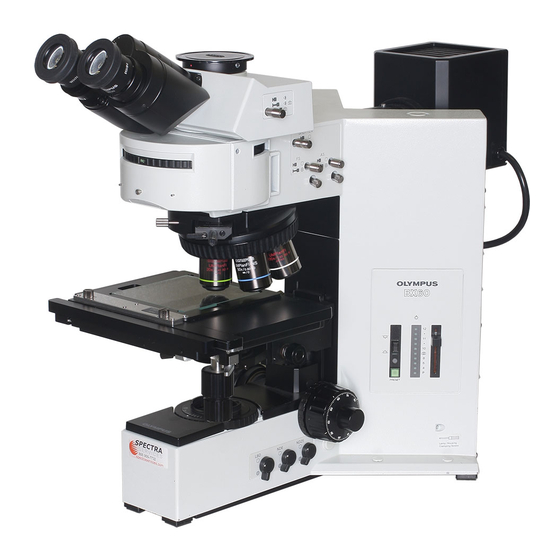Olympus BX60 Manual de instruções - Página 25
Procurar online ou descarregar pdf Manual de instruções para Microscópio Olympus BX60. Olympus BX60 48 páginas. System microscope
Também para Olympus BX60: Manual de início rápido (4 páginas)

Fig. 33
I Using the Aperture Iris Diaphragm
I
• Reflected light BrightfieM Observation
In general, a good image is obtained if the diaphragm is stopped down
to 7080% of tha objective's numerical aperture.
• Reflected light Oarkfield Observation
Always keep the aperture iris diaphragm knob @ pushed in to leave the
diaphragm open.
0 Depending on the specimen, an image with good contrast and little
Rare may sometimes be obtained by keeping the aperture iris diaphragm
stopped down a Unto more. Please experiment with this to see if it
works with the particular specimen.
1 Using the Pinhole Diaphragm
(Ras, 32.33) I
O When using a 2S0X objective, use the pinhole diaphragm to enhance
the effect of the aperture iris diaphragm.
1. Push in the aperture iris diaphragm knob ® to open the diaphragm.
2. Pull out the pinhole knob© to bring the pinhole diaphragm into the light
path. (Fig. 33)
* Tha pinhole diaphragm is placed at the same position as the
aperture iris diaphragm, and centration may bo lost when the
aperture iris diaphragm Is adjusted.
3. Place a mirror or other highly reflective specimen on the stage. With the
eyepieces in place, rotate the fine adjustment knob in the direction where
the specimen and objective move away from each ether unta the contour
of tha pmhoie becomes voible.
4. At this point if centration of the pinhole diaphragm is imprecise, use the
two aperture tris diaphragm centering knobs (3) to adjust the centration.
5. Bring the specimen into focus again.
* If the aperture iris diaphragm is stopped down when using the
pinhole diaphragm, flare may occur.
* The pinhole diaphragm is placed so that it can be centered at the
same position as the aperture iris diaphragm. However, due to
constfuction considerations, e certain play ftKTffra. This is required
for the pinhole diaphragm performance and it does not indicate
a malfunction.
* When using the pinhole diaphragm, contaminants on the eye
pieces and photo-eyepiece may become noticeable. To prevent
this, dean eyepieces periodically.
Using the Filters
(Fig. 34)
Engage the filters suitable for the particular observation.
Fig. 34
21
